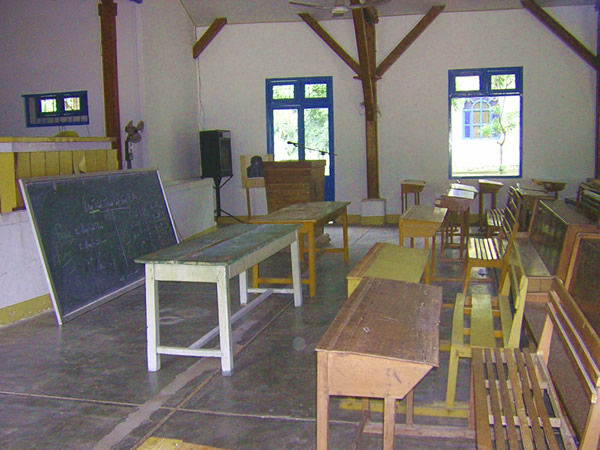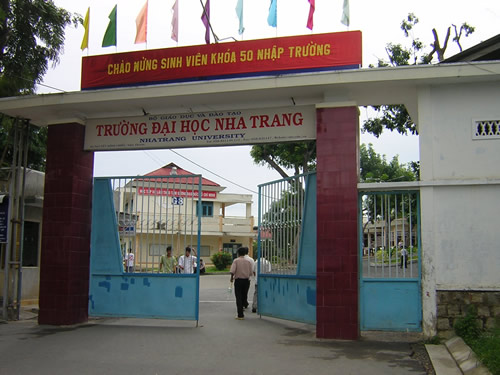Volunteer in Vietnam Teaching with Volunteers in Asia
Article and photos by Katherine Pittore
 |
| A classroom during a break from teaching English at Nha Trang University in Vietnam. |
I decided in high school that I would join the Peace Corps upon graduating from college, but no one, including myself, took me seriously until I had submitted my application, gone for my interview, been nominated, and had filled out extensive medical forms. However, as I was completing the process, I grew more and more apprehensive about the Peace Corps, especially since a simple Google search provides thousands of negative experiences (as well as a comparable number of wonderful experiences). I had discussions with several professionals working in South America and Africa with humanitarian organizations, as well as a conversation with a returned Peace Corps volunteer. The information conveyed convinced me that the Peace Corps was not the appropriate organization for me at that point in my life, so I started searching for other possible ways to go abroad in order to volunteer. I wanted to find a way to volunteer abroad in a productive capacity with an organization that was reputable and respected for their work while being invested in contributing in a beneficial way to the community.
I eventually chose to go abroad with a program called Volunteers in Asia (VIA), a small, non-profit organization based in San Francisco which sends about 40 individuals to China, Indonesia, Vietnam, Laos, Myanmar (Burma), and Thailand each year. VIA offers several programs, including short-term volunteer programs for American college students, long-term volunteer programs which last for 1-2 years for anyone with a college degree, and programs which bring students from Asia to study in the United States. I was interested in the long-term volunteer program which placed volunteers in positions such as English teachers in Universities or at English language assistant posts where the volunteer helps provide necessary English skills and training at a non-profit. The organization seemed to fit all my criteria, was relatively inexpensive (compared to many programs which charged participants up to US$5,000 for participation), and received high reviews in the classic book on volunteering abroad: How To Live Your Dream of Volunteering Overseas. The process to join the program was initialed by an application and an interview, either at the office — if you are based near San Francisco — or an alumni interview (I was interviewed by a panel of volunteers in Boston). I was accepted to the program in March, and packed my bags for a mandatory orientation held over a long weekend at a retreat center near San Francisco at the end of April. There, I had the opportunity to meet with all the long- term volunteers, learn more about the organization. I was briefed about my “post” as a volunteer in Vietnam, and was prepared for the inevitable culture shock when going abroad.
Posts, or where you are stationed for the next year, are determined based upon the dialogue between the volunteer and VIA. This helps ensure that the volunteer is appropriately placed and that the host organization receives someone who is appropriate for their needs. Initially, when applying to VIA, you are accepted into a certain country (for me it was Vietnam), and then post decisions are made after all the volunteers have met and spoken with their country representative (each country program has a director based in San Francisco). My post assigned post was in Nha Trang University, a government run university located in on the southern coast of Vietnam which is working to develop a new English program.
 |
| Entrance to Nha Trang University. |
Once we received our posts, we were ready to prepare for our next stop, Chiang Mai, Thailand, where all the volunteers met for two weeks of intensive course work in teaching English as a second language and cultural immersion training. During the evenings we also had the chance to meet with the directors of non-profit organizations based in Thailand to learn about their work and also hear their perspective on the role of Americans volunteering abroad.
Following two weeks of orientation in Thailand, the large group of long-term volunteers broke up, and each group (Vietnam, China, Indonesia, Myanmar, and Laos) flew to their own country for two weeks of language training before traveling to their individual posts. For Vietnam, volunteer language training was held in Ho Chi Minh City, the largest city in Vietnam. Language classes were held all morning. The afternoons were left free for exploring the city and dealing with important logistics such as setting up banking accounts, learning more about Vietnam at the US consulate, and meetings with doctors to learn how to stay healthy in Vietnam.
At their posts, volunteers are supported by an in-country representative as well as a program director based in San Francisco who can help navigate through inevitable problems that will occur when working and living abroad. Living and working in Vietnam, becoming part of a community, developing friendships and learning a new language are all unbelievable experiences, but there are also challenges associated with living and working abroad. VIA is realistic about such challenges, and helps you work towards addressing any problems you may encounter. Friends who you make during the orientation also serve as an invaluable network. These are people with whom you can share your joys and frustrations with other volunteers going through similar experiences.
Volunteers in Asia has several strong points which make it a good organization to consider if you are seriously considering a long-term overseas assignment. One is the size of the organization, which is very small relative to an organization such as the Peace Corps, which means that volunteers all know one another and that volunteers are active in the operation of the program. Another advantage is that the organization is not affiliated with any government, which allows VIA to work in countries such as Vietnam and Myanmar, where programs affiliated with the U.S. government would not necessarily be welcome. VIA also forces volunteers to think about the realities of Americans volunteering aboard and works hard to insure that volunteers are aware of the implications of their presence. They also strive to not displace local workers and only assign volunteers to positions which require native speakers.
Many returning volunteers remain active in work involving Vietnam and in development work. The organization works hard to maintain an alumni network. Alums are active in interviewing, donating, and insuring the continuity of the organization. VIA prides itself in being more of a family then simply an organization. If you are serious about a long-term assignment in Asia teaching English and cultural immersion, VIA is a great organization to consider.
For More Information
My cost with VIA as a long-term volunteer was US$2,000, which paid for orientation accommodations, visa fees, insurance, travel from Thailand to Vietnam, travel to my post, housing, a small living stipend, a conference once a year, and travel back home at the end of my volunteer service. Your costs may vary slightly depending upon your destination and project, so check out their website for details.
Volunteers in Asia is truly a volunteer position and your stipend will reflect that. You will be making less then volunteers with some organizations, so having some savings is advisable. You are responsible for the cost of food during orientation. But your total oulay is far less than participating with a private volunteer sending organization. For more information on available posts and how to apply, visit viaprograms.org.
Katherine Pittore graduated from Wesleyan University. She is currently attempting to learn Vietnamese and delve into the world of writing from her base in Nha Trang, Vietnam.
|
